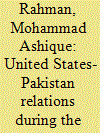|
|
|
Sort Order |
|
|
|
Items / Page
|
|
|
|
|
|
|
| Srl | Item |
| 1 |
ID:
083790


|
|
|
|
|
| Publication |
2008.
|
| Summary/Abstract |
The year 2007 for South Asia has been a mixture of both turmoil and remarkable achievements, making it more talked about in world affairs. Almost all the nations in the region saw domestic political unrest during the period, and perhaps the single most incident that shook the region just by the end of the year was the assassination of Pakistan's ex -Prime Minister Benazir Bhutto. Other significant incidents throughout the year included declaration of the state of emergency in Bangladesh, instabilities in Nepal, stalled peace process in Sri Lanka, and wobbly move towards democratization in Bhutan and Maldives. On a regional plane, there were no significant regional initiatives under the aegis of SAARC, except some regular ministerial meetings and forums, and no initiatives for conflict resolution. For bilateral relationship, India-Pakistan relations maintained the status quo whereas an improvement in Bangladesh-India relationships was evident. Against this backdrop, the paper attempts to provide a review of all these events and issues that occurred in South Asia in 2007, with a focus on their implications for regional peace and security. Moreover, throughout the discussion, an attempt has also been made to assess the argument that the domestic and/or internal factors became prominent in South Asia in the year of 2007
|
|
|
|
|
|
|
|
|
|
|
|
|
|
|
|
| 2 |
ID:
108881


|
|
|
|
|
| Publication |
2011.
|
| Summary/Abstract |
United States-Pakistan relations and devising appropriate policy responses surfaced as one of the most critical foreign policy challenges for the United States since late 2007. The heightened US concern followed the simmering growth of suicide terrorism and extremism in Pakistan as well as the unprecedented increase in al Qaeda and the Taliban attack on the US allied forces in Afghanistan staged from the "safe haven" of Afghanistan-Pakistan border areas. Scholars, analysts and the policymakers started to venture what is wrong with US-Pakistan relations. After the tragic event of 11 September 2001, the United States renewed its relationship with Pakistan, and declared it as an "indispensable ally" against the "global war on terror". It has also been incorporated as a "frontline state" in fighting the US-led war against terrorism in Afghanistan. Ironically, this post-11 September deep alliance between the US and Pakistan also coincided with the latest round of military dictatorship of General Pervez Musharraf in Pakistan. Therefore, a comprehensive analysis of US-Pakistan relations during the Musharraf regime might help us in explaining the problems that their bilateral relations are currently facing and may shed light in formulating future policies for Pakistan afresh. The present paper therefore, focuses on three aspects of the US-Pakistan relations during the Musharraf regime. First, it intends to assess United States' policy objectives during the Musharraf era. Obviously, fighting and eradicating terrorism and extremism was a dominant objective, but there were other objectives as well viz., Pakistan's and global security, nuclear non-proliferation, US's economic and strategic opportunities in South Asia, and democracy promotion in the Muslim world. Second, an attempt is made to analyse the strategies that were followed to pursue the objectives? Economic and security assistances are well-known strategies, but, was implicit support to Musharraf's military regime also a part of US strategy? If yes, what explains such strategy especially since it is contradictory to US's grand strategy of democracy promotion? And finally, what results were achieved by pursuing those policies in such particular way? Therefore, the paper would seek answers to such questions: Were the policies pursued by the US appropriate? Were the ways in which they were pursued the most effective way? Is the present situation in Pakistan an outcome of wrong policies or the wrong strategies? And what explains the lack of US' success?
|
|
|
|
|
|
|
|
|
|
|
|
|
|
|
|
| 3 |
ID:
111764


|
|
|
|
|
|
|
|